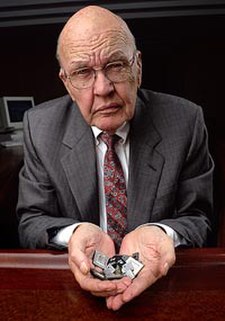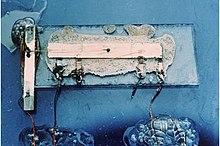| Jack Kilby | |
|---|---|
 |
Jack St. Clair Kilby (November 8, 1923 - June 20, 2005) was a Nobel Prize laureate in physics in 2000 for his invention of the integrated circuit in 1958 while working at Texas Instruments (TI). He is also the inventor of the handheld calculator and thermal printer
Biography
Kilby's life began in Great Bend, Kansas where he grew up and attended school. He graduated from Great Bend High School. Road signs at the entrances to the town commemorate his time there, and the Commons Area at Great Bend High School has been named The Jack Kilby Commons Area.
Kilby received his bachelor of science degree from the University of Illinois at Urbana-Champaign where he is an honorary member of Acacia Fraternity. In 1947, he received a degree in Electrical Engineering. He obtained his master of science in Electrical Engineering from the University of Wisconsin–Milwaukee in 1950, while simultaneously working at Centralab in Milwaukee.
In mid-1958, Kilby was a newly employed engineer at Texas Instruments who did not yet have the right to a summer vacation. He spent the summer working on the problem in circuit design that was commonly called the "tyranny of numbers" and finally came to the conclusion that manufacturing the circuit components en masse in a single piece of semiconductor material could provide a solution. On September 12 he presented his findings to the management, which included Mark Shepherd, of Texas Instruments: he showed them a piece of germanium with an oscilloscope attached, pressed a switch, and the oscilloscope showed a continuous sine wave, proving that his integrated circuit worked and thus that he solved the problem. U.S. Patent 3,138,743 for "Miniaturized Electronic Circuits", the first integrated circuit, was filed on February 6, 1959. Along with Robert Noyce (who independently made a similar circuit a few months later), Kilby is generally credited as co-inventor of the integrated circuit.
In addition to the integrated circuit, Kilby also is noted for patenting the electronic portable calculator and the thermal printer used in data terminals. In total, he held about 60 patents.
From 1978 to 1985, he was Distinguished Professor of Electrical Engineering at Texas A&M University. In 1983, Kilby retired from Texas Instruments.
Kilby died June 20, 2005 when he was 81, in Dallas, Texas, following a brief battle with cancer.
On December 14, 2005, Texas Instruments created the Historic TI Archives. The Jack Kilby family donated his personal manuscripts and his personal photograph collection to Southern Methodist University. The collection will be cataloged and stored at DeGolyer Library, SMU.
Included in the two collections is the world’s richest history in technology and engineering.[citation needed] Among the items are numerous firsts: the integrated circuit, the commercial transistor, the electronic calculator, the single-chip microprocessor, early digital watches, and early cell phone technologies. The Library of Congress houses the majority of the papers of Jack Kilby.
In 2008, the SMU School of Engineering, with the DeGolyer Library and the Library of Congress, hosted a yearlong celebration of the 50th anniversary of the birth of the digital age with Jack Kilby’s Nobel Prize-winning invention of the integrated circuit. Symposia and exhibits examined the many ways in which technology and engineers shaped the modern world. Jack Kilby was a holder of an honorary Doctorate of Science from SMU and longtime associate of SMU through the Kilby Foundation.
Awards and honors
Recognition of Kilby’s outstanding achievements have been made by the Institute of Electrical and Electronic Engineers (IEEE), including award of Fellow grade in 1966, the David Sarnoff Medal in 1966, the Stuart Ballantine Medal in 1966, co-recipient of the IEEE Cledo Brunetti award in 1978, The IEEE Centennial Medal in 1984 and the IEEE Medal of Honor in 1986. He was co-recipient of the Franklin Institute’s Stuart Ballentine Medal in 1966. In 1982 and 1989, he received the Holley Medal from the American Society of Mechanical Engineers (ASME.) He was a member of the National Academy of Engineering and received the Academy’s Vladimir K. Zworykin Award in 1975, was co-recipient of the NAE’s Charles Stark Draper Prize in 1989.The Kilby Award Foundation was founded in 1990 in his honor.
He is also the recipient of the nation’s most prestigious honors in science and engineering: the National Medal of Science in 1969 and the National Medal of Technology in 1990. In 1982, he was inducted into the National Inventors Hall of Fame.
In 1993 he was awarded the prodigious Kyoto Prize by the Inamori Foundation. He was awarded both the Washington Award, administered by the Western Society of Engineers and the Eta Kappa Nu Vladimir Karapetoff Award in 1999. In 2000, Kilby was awarded the Nobel Prize in Physics for his breakthrough discovery, and delivered his personal view of the industry and its history in his acceptance speech.
Kilby was awarded nine honorary doctorate degrees from Universities including Southern Methodist University, the University of Miami, University of Illinois, University of Wisconsin-Madison, Texas A & M, Yale and Rochester Institute of Technology.. The National Chiao Tung University (NCTU) in Taiwan awarded Kilby with a certificate of Honorary Professorship in 1998.
The Kilby Center, TI's research center for silicon manufacturing, is named after him.
The Jack Kilby Computer Centre at the Merchiston Campus of Edinburgh Napier University in Edinburgh is also named in his honor.
From Wikipedia, the free encyclopedia

Tidak ada komentar:
Posting Komentar